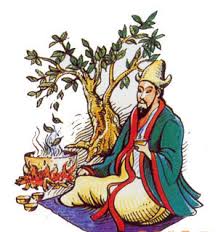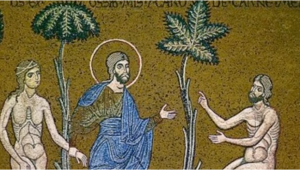Will Marijuana Save the World?
July 14, 2018
A good cannabis high is like opening the shades and letting light stream into a darkened room.
Our relationship with cannabis goes back to the very dawn of the human species. Pot has been an elixir. Below Dr, Mercola summarizes Chris Rice's documentary, Cannabis: A Lost History which reveals that marijuana was the source of religious inspiration. I know this is abhorrent to some readers, but if a herb actually helped us be more like Jesus intended, what is the harm?
Medical cannabis is now legal in 30 U.S. states,6,7 the majority of which allow limited use of medical marijuana under certain medical circumstances, although some limit medical cannabis to oils or pills only. Eight states have legalized it for recreational use.
Cannabis: A Lost History (Footnotes here)
by Dr. Mercola
(henrymakow.com)
Cannabis, better known as marijuana, has been used for its medicinal properties for thousands of years. It's been heralded as a "cure-all," revered for its healing properties, particularly for pain but also as a potential anticancer treatment. Marijuana was a popular botanical medicine in the 19th and 20th centuries, common in U.S. pharmacies of the time.
It wasn't until 1970 that the herb was declared a Schedule 1 controlled substance in the U.S., a classification reserved for drugs with "high potential for abuse" and "no accepted medical use." Three years later, the Drug Enforcement Agency was formed to enforce the newly created drug schedules, and the fight against marijuana use began. In light of its history as a global panacea for all sorts of ills, its classification as a controlled substance is particularly unjustified.

As noted in the documentary "Cannabis: A Lost History," written, directed and narrated by Chris Rice, marijuana has been "an integral part of human civilization," featuring in ancient Japanese cave paintings, as well as Chinese and Siberian burial rites dating back to 3000 B.C. Based on the evidence -- especially the discovery that the human body is equipped with a cannabinoid system -- it appears our relationship with cannabis goes back to the very dawn of the human species.
Historical remnants from all around the world also reveal the importance of cannabis in medicine and spirituality. For example, Taoist monks in ancient China burned cannabis as incense, and consumed it with ginseng -- a combination thought to open your psychic centers, allowing you to see the future. Cannabis was also revered as sacred in Hinduism, Zoroastrianism, and Buddhism.
CANNABINOIDS AND THE CANNABINOID RECEPTOR SYSTEM
The marijuana plant contains more than 60 different cannabinoids; chemical compounds the human body is uniquely equipped to respond to. The two primary ones are cannabidiol (CBD) and tetrahydrocannabinol (THC), the latter of which is the psychoactive component. Cannabinoids interact with your body by way of naturally occurring cannabinoid receptors embedded in cell membranes throughout your body.
There are cannabinoid receptors in your brain, lungs, liver, kidneys, immune system and more; the therapeutic (and psychoactive) properties of marijuana occur when a cannabinoid activates a cannabinoid receptor. Your body also has naturally occurring endocannabinoids similar to THC that stimulate your cannabinoid receptors and produce a variety of important physiologic processes.
So, your body is actually hard-wired to respond to cannabinoids through this unique cannabinoid receptor system. We still don't know exactly how far its impact on your health reaches, but to date, it's known that cannabinoid receptors play an important role in many body processes, including metabolic regulation, pain, anxiety, bone growth and immune function.1
THE EARLIEST HISTORY OF CANNABIS
According to the featured video, the earliest written references to cannabis are found in the Chinese Materia Medica, said to be written by Shen Nung around 2800 B.C. The oldest known copy of this book dates back to 50 B.C. Nung is one of three "celestial emperors" revered in the Chinese culture. "Half emperor, half deity, he is said to have ruled over China long before written history," Rice says.

Nung is credited with inventing agriculture -- including the hoe, the plow, and irrigation -- as well as acupuncture and Traditional Chinese Medicine (TCM). Often depicted draped in leaves and chewing on various plants, Nung was the first pharmacologist, experimenting with and recording the health effects of plants. Nung documented around 100 different conditions that responded well to cannabis, including gout, rheumatism, malaria, and absentmindedness.
Before Nung declared its medicinal attributes, the cannabis plant, called "ma" in Chinese, had been used for centuries in the production of textiles, paper, rope, and pottery. Around 200 A.D., a Chinese physician named Hua Tuo performed the first surgery using an anesthetic -- a formula called Ma Fei San, which translates to "cannabis boiling powder."
For thousands of years, cannabis remained one of the 50 essential plants used in TCM. It was only removed from widespread use in recent times due to its controversial legal status. The film also reviews the history of cannabis in Indian culture. In the Vedas, the sacred text of India, cannabis (bhang) is listed as one of five sacred plants, and the Hindu god Shiva is referred to as "Lord of the bhang," meaning the Lord of cannabis.
According to the Mahanirvana, "bhang is consumed in order to liberate oneself," and liberation is the path to immortality. The ancient Egyptians, Persians and Greeks also used cannabis in a variety of ways, including medicinally and for spiritual upliftment. References to cannabis are even found in Islamic, Judaic and Christian texts, although an error in translation appears to have crept into the Bible along the way. The original Hebrew term "kaneh bosm," or cannabis, is found several times in the Old Testament.
In Exodus, chapter 30, God instructs Moses on how to make a holy anointing oil: "Take for yourself choice spices: 500 shekels of pure myrrh, half as much fragrant cinnamon, 250 shekels of kaneh bosm and 500 shekels of cassia and mix these with olive oil." In more modern Bibles, kaneh bosm has been translated as sweet calamus. The problem is this plant does not have the properties that the Bible ascribes to kaneh bosm.

According to the film, a 12th-century painting found in a Sicilian basilica also "appears to show Jesus near a pot leaf." The painting is titled "Jesus healing the blind." Interestingly enough, "modern scientific studies have since proven that cannabis delays retinal degeneration," Rice says.
----
CONTINUED- Details of Medicinal Benefits Cannabis is a panacea.
Related- Makow - Does George Soros want us to use Weed to Know God? ------------- Did Christ Use Marijuana? and here






MK said (July 17, 2018):
yes yes it will. I personally have healed 10 people of different cancers + Krohns disease as well.
mk